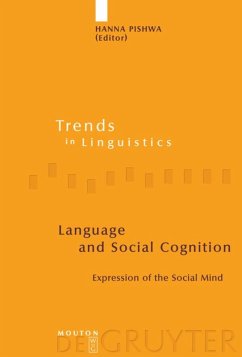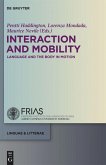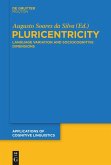In a collection of 16 papers, eminent scholars from several disciplines present diverse and yet cohering perspectives on the expression of social knowledge, its acquisition and management. Hence, the volume is an attempt to view the social functions of language in a novel, systematic way. Such an approach has been missing due to the complexity of the matter and the emphasis on purely cognitive properties of language.
The volume starts with a presentation of overarching issues of the social nature of humans and their language, providing strong evidence for the social fundaments of human nature and their reflection in language and culture. The second section demonstrates how social functions can be displayed in discourse by using language play and humor, irony and attributions as well as references to social schemas. The chapters in the third part examine a wide range of particular linguistic elements carrying social-cognitive functions. An important finding is that social-cognitive functions have to be inferred on the basis of social knowledge, frequently with the help of non-verbal cues, since languages offer only few direct expressions for them. In other words, linguistic devices used to express social content tend to be multifunctional. Interestingly, this multifunctionality does not prevent their rapid recognition.
The volume presents valuable information to linguists by widening the cognitive-linguistic framework and by contributing to a better understanding of the role of pragmatics. It is also beneficial to social and cognitive psychologists by offering a broader view on the encoding and decoding of social aspects. Finally, it offers a number of fruitful ideas to students of cultural and communication studies.
The volume starts with a presentation of overarching issues of the social nature of humans and their language, providing strong evidence for the social fundaments of human nature and their reflection in language and culture. The second section demonstrates how social functions can be displayed in discourse by using language play and humor, irony and attributions as well as references to social schemas. The chapters in the third part examine a wide range of particular linguistic elements carrying social-cognitive functions. An important finding is that social-cognitive functions have to be inferred on the basis of social knowledge, frequently with the help of non-verbal cues, since languages offer only few direct expressions for them. In other words, linguistic devices used to express social content tend to be multifunctional. Interestingly, this multifunctionality does not prevent their rapid recognition.
The volume presents valuable information to linguists by widening the cognitive-linguistic framework and by contributing to a better understanding of the role of pragmatics. It is also beneficial to social and cognitive psychologists by offering a broader view on the encoding and decoding of social aspects. Finally, it offers a number of fruitful ideas to students of cultural and communication studies.








